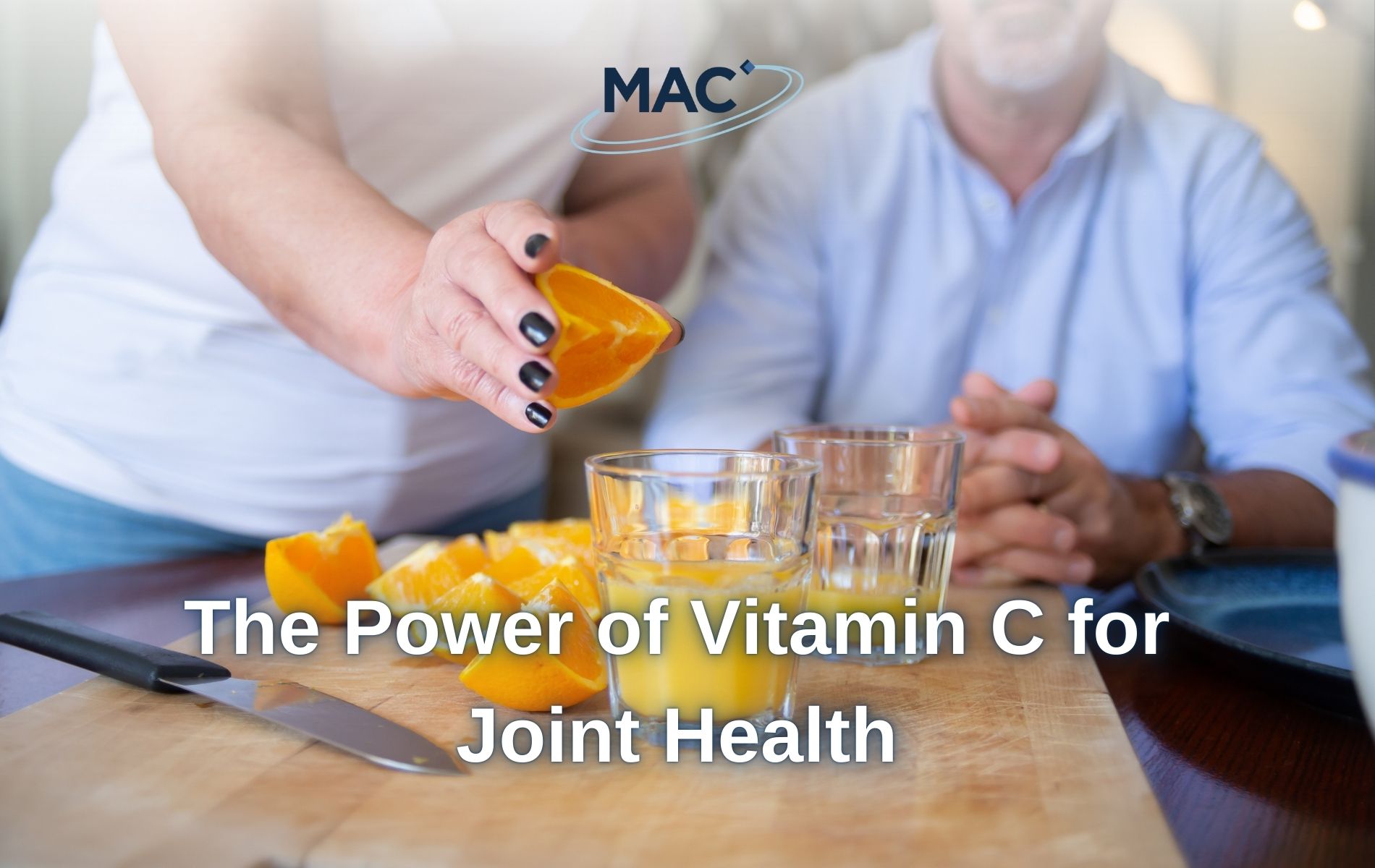Today is National Vitamin C Day in the USA, a perfect opportunity to highlight the crucial role this essential nutrient plays in our health. While many associate Vitamin C with immunity and skin benefits, its impact on joint health is equally remarkable.
Understanding Osteoarthritis and Joint Health
Knee osteoarthritis (OA) is a common condition that impacts around 5.4 million people in the UK1. It occurs when the protective cartilage that cushions the ends of your bones wears down over time, leading to pain, stiffness, and reduced mobility. While there’s no cure, lifestyle choices, including nutrition, can play a major role in slowing progression and alleviating symptoms.
How Vitamin C Supports Joint Health
Vitamin C, also known as ascorbic acid, is a water-soluble vitamin with powerful antioxidant properties. Here’s how it benefits joint health:
- Boosts Collagen Production – Collagen is a key structural protein that helps maintain the integrity of cartilage: the flexible tissue that cushions joints. Vitamin C is essential for collagen synthesis, meaning it plays a direct role in keeping cartilage strong and resilient2. Without adequate Vitamin C, collagen production declines, potentially accelerating cartilage breakdown in osteoarthritis.
- Fights Oxidative Stress – Inflammation and oxidative stress are major contributors to joint degeneration in knee OA. Unstable molecules that damage cells can accumulate in joints, leading to pain and inflammation3. Vitamin C is a potent antioxidant that neutralises these molecules, helping to reduce oxidative stress and slow cartilage deterioration.
- Reduces Inflammation – Chronic inflammation is a key driver of OA symptoms. Research suggests that Vitamin C has anti-inflammatory properties, which may help decrease swelling and discomfort in the knees4. By reducing inflammation, Vitamin C could contribute to improved mobility and a better quality of life for those with OA.
- Supports Tissue Repair and Healing – OA can lead to joint damage over time, but Vitamin C plays a vital role in the body’s natural healing processes. It supports tissue repair and helps maintain the health of ligaments, tendons, and cartilage, all of which are crucial for joint function5.
How to Get More Vitamin C in Your Diet
The good news is that increasing your Vitamin C intake is easy and delicious! Here are some of the best food sources rich in Vitamin C:
- Citrus fruits (oranges, grapefruits, lemons)
- Berries (strawberries, blueberries, raspberries)
- Bell peppers (especially red ones)
- Kiwi
- Tomatoes
- Leafy greens (spinach, kale)
- Broccoli and Brussels sprouts
For those struggling to meet their daily needs through diet alone, Vitamin C supplements are also an option. However, it’s always best to consult a healthcare professional before starting any supplement regimen.
Improving Quality of Life for Knee OA Patients
Although increasing consumption of Vitamin C may ease some symptoms of knee OA, many patients feel let down by current medical treatments.
MAC Clinical Research understand the challenges that come with living with knee OA and are committed to improving the quality of life for those living with the condition through groundbreaking clinical trials, researching into potential new treatments.
MAC Clinical Research is conducting a new study for a potential knee OA treatment, but we need your help. If eligible you will receive £2010 for your time and commitment, plus reasonable travel expenses will be paid.
If you’re aged between 25 and 79, have moderate or severe OA in your knee, and want to take part in a research trial, visit our knee OA webpage to register your interest.
1 Versus Arthritis – Key Findings
2 Versus Arthritis – Vitamins A, C and E
3 Therapeutic Advances in Chronic Disease – Vitamin C supplementation for the treatment of osteoarthritis: perspectives on the past, present, and future
4 Journal of Personalised Medicine – Anti-Inflammatory Effect of Vitamin C during the Postoperative Period in Patients Subjected to Total Knee Arthroplasty: A Randomized Controlled Trial
5 The American Journal of Clinical Nutrition – Vitamin C–enriched gelatin supplementation before intermittent activity augments collagen synthesis




